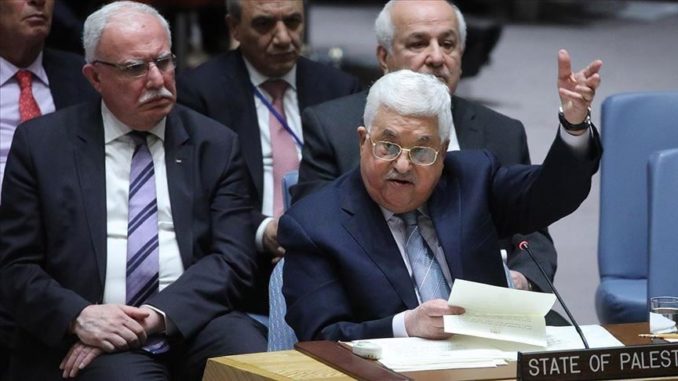
Palestinian President Mahmoud Abbas on Tuesday bashed the U.S. administration’s plan for Middle East peace and urged the UN Security Council to help the Palestinians launch a new negotiation effort.
In a 36-minute address to the UN Security Council, Abbas criticized the U.S. plan that gave Israelis almost everything they wanted and left the Palestinians with “islands” of territory and a country that looked on a map like “Swiss cheese”.
“We call on ending the occupation and on establishing our Palestinian state. Our people will not surrender and we will not surrender. We will continue to demand our rights. If you give us our rights then we will stand with you,” Abbas told the 15-nation chamber.
“I am ready to start negotiations, as I was ready always, if we have a partner in Israel ready for peace, ready for negotiations under the sponsorship of the international Quartet and on the basis of internationally agreed-upon parameters.”
Abbas called for the expansion of the Middle East Quartet — a grouping of the U.S., the U.N., the European Union and Russia that has in the past played a lead role in peace talks but has in recent years been less active.
“I call on the international Quartet and I call on the members of the UN Security Council to hold an international conference for peace,” said Abbas.
Still, the Palestinians did not appear to have enough support in the council to put a resolution they had backed, an original version of which criticized Israeli land grabs and the U.S. plan, up for a vote on Tuesday.
“We will not resort to violence or terrorism,” said Abbas.
“No matter how strong the attack against us is, we believe in peace. We believe in combatting violence and therefore we will not resort to violence. We are willing to cooperate with any country against terrorism and violence.”
U.S. President Donald Trump on January 28 released a long-awaited plan that envisions a disjointed, unarmed Palestinian state, subject to Israeli control over its security, with tracts of desert in return for arable land in the West Bank on which Israeli settlers now live.
BY ANADOLU AGENCY
